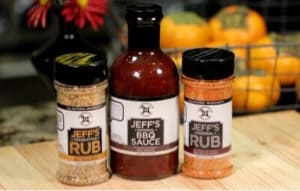I agree, a dry brine would have much the same effect. However, I respectfully disagree with your point on moisture retention. Brining (wet or dry) will denature the proteins at and just below the surface of the meat. While I agree that the inner structure of the meat remains unchanged, the change in the outer structure effectively sets up a road block to the escape of the internal moisture of the meat. I think we all agree that as meat cooks it tends to squeeze out moisture. If, however, there is a band of denatured proteins surrounding the entire muscle, basically acting as a sponge, the moisture moving from the interior of the meat is going to have a harder time getting out. This will result in retention of a greater percentage of moisture. The perceived increase in tenderness is really just a byproduct of more moisture.
Otherwise, how else would a dry brine work? You're certainly not adding any moisture to the meat. Plus, conventional wisdom dictates that salting meat removes moisture. Look at things like Prosciutto. However, a short dry brine, while it does remove a little moisture, is really only affecting the outer few millimeters of the meat much the same way a wet brine does, and this is what allows the meat to retain more of its own moisture.
BUT, we are talking about a large cut of meat that's going to cook for many hours, so the effect is greatly reduced, and may be entirely unnecessary. Unless you're like me and tend to get distracted by things like sleep, TV, butterflies and shiny objects and forget to check on the smoker for a while. I'll take any little added insurance I can get.
I am not sure where you are getting this from. The bulk of the extra Moisture comes from the brine solution denatured proteins do not act like a Sponge absorbing moisture coming from the interior. The protein absorbs Brine liquid and retains existing moisture unless over cooked to the point they Squeeze this moisture out. Another example is a Quiche or Custard. Cooked exactly to the right temp, solid, firm and creamy...A couple of degrees too far and you get a pile of Curdled Egg Protein at the bottom of a pool of Water... Denaturing also happens when the protein is Cooked. If denatured protein set up a road block then a Well Seared Steak or Butt with Heavy Bark would not lose one drop of moisture during the rest, we know from the bottom of a Plate or Pan after resting this is not true.
This is from an article by Shirley Corriher, a well respected Food Scientist... Brining enhances juiciness in several ways. First of all, muscle fibers simply absorb liquid during the brining period. Some of this liquid gets lost during cooking, but since the meat is in a sense more juicy at the start of cooking, it ends up juicier. We can verify that brined meat and fish absorb liquid by weighing them before and after brining. Brined meats typically weigh six to eight percent more than they did before brining—clear proof of the water uptake.
Another way that brining increases juiciness is by dissolving some proteins. A mild salt solution can actually dissolve some of the proteins in muscle fibers, turning them from solid to liquid.
Here is the Hardcore Science behind Brining...
http://www.edinformatics.com/math_science/science_of_cooking/brining.htm
The second statement is also not entirely true...Taken from Modernist Cuisine which is the latest and greatest info on Food Science to date...
https://www.stellaculinary.com/podcasts/video/the-science-behind-brining-resource-page
Now the naturally intuitive question arises; why do both dry salt rubs and brines yield juicier meats? In fact, there is a blatantly false culinary dogma that states salting meat before cooking will draw out excess moisture, yielding a dry, finished product.
This however is not only false, but the exact opposite of what happens when a protein is salted.
"...even if there is no surrounding water to draw in, proteins are modified by the ions in ways that cause them to bind the water in the flesh more tightly -- as well as to resist the shrinking of muscle fibers that squeezes juices out during cooking. The flesh continues to swell and bind water more tightly until its salinity increases to 6%, and then it shrinks and begins to lose water.
When making a dry brine, salt is usually mixed with other dry seasonings such as herbs and spices and rubbed onto the surface of the protein. A good starting point for the amount of salt to use is around 1% based on the protein’s weight.
The salt rub is left on for a given period of time, (anywhere from 4-48 hours), and then cooked as is, usually without being rinsed. Although this method doesn’t introduce excess water to be absorbed, the salting does allow the protein to bind moisture more tightly, yielding a moister finished product, assuming of course that the protein is cooked properly.
This Dry Brine binds existing moisture in the protein but does not absorb any from the interior meat.
Here is another Science Geek/Writer who did an article on Brining for the Huffington Post...
http://www.huffingtonpost.com/craig-goldwyn/brining-a-turkey_b_1093300.html
[h2]What to brine[/h2]
Brining works best on chicken breasts, turkey breasts, lean pork loins, salmon and other oily fish. Chicken and turkey thighs and other cuts of pork usually are moist enough from fat that they don't need brines. But it can give them a boost. I have been known to brine pork ribs but most of the time, I don't bother. The return for the effort is minimal. I never brine red meats unless I am making corned beef.
I have additional information from the text books I used when I taught Food Science and Brining but I have no idea where they are since the last move...
...JJ






